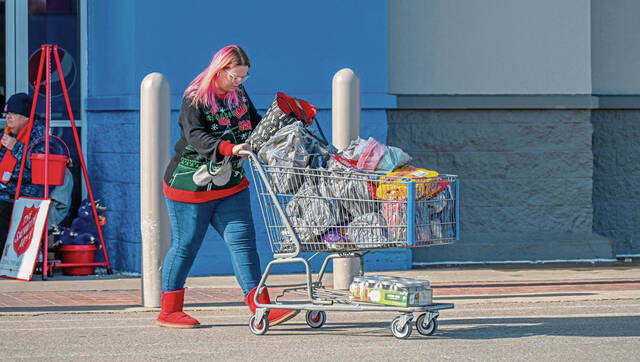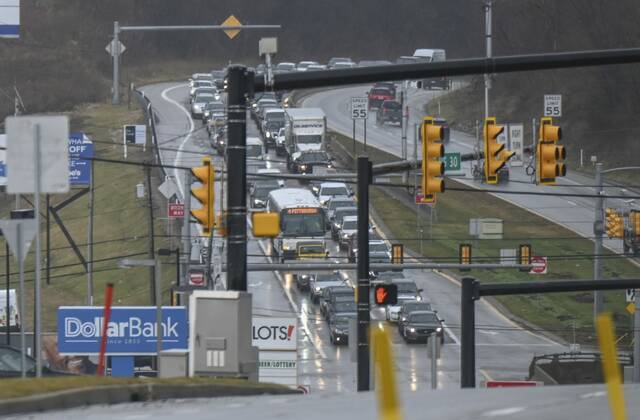Whether you’re shopping for tech deals on Amazon or indie crafts on Etsy, you probably noticed there are more options at checkout than just using a credit card.
More retailers are using “Buy Now, Pay Later” platforms such as Klarna, Affirm, Afterpay and Paypal to spread out payments in installments.
Think of it like a reverse layaway system — you get your product upfront and pay for it over a determined period, often over four payments and sometimes without interest.
These platforms represent a growing sector, getting a huge boost during the pandemic when covid-19 drove more shopping online.
Between 2019 and 2021, the number of BNPL loans originated by the top five lenders grew by 970% to 180 million, while the dollar volume of those loans grew by 1,092% to $24.2 billion, according to the Consumer Financial Protection Bureau.
Jennifer Wilson of New Kensington estimated that BNPL services like Klarna and Affirm will cover about one-third of her holiday shopping budget for purchases with Amazon and Ticketmaster.
“It’s great. You don’t have to pay up until three months or longer,” Wilson said.
With no interest charged, the service “is absolutely helpful,” she said. “It’s much better than credit cards.”
Additionally, Wilson said the BNPL services communicate well with customers when it comes to payment alerts and other issues.
Still, other folks are a little more cautious.
“I’ve seen the advertisements for that type of thing, but I just don’t really feel the need to use it,” said Delmont resident Hannah Donnelly.
Rachael and Robert Miller of West Leechburg have a long gift list including their nine children, five cats, one dog and three guinea pigs.
The couple said although they were familiar with different financing options for buying gifts, they weren’t familiar with Buy Now, Pay Later plans.
The couple has little interest in financing their holiday purchases.
“I don’t want to get into debt,” said Rachael Miller, 44. Both have been working 20 hours of overtime, collectively, each week to raise extra money for their holidays.
Millennials and younger consumers were early adopters of BNPL, but the use is increasing across age groups, according to Moody’s Investors Service.
“There has been a fundamental shift in consumer preference over the last couple years, especially among younger people who distrust credit, having lived through the financial crisis,” said Ryan Phillips, spokesman for Affirm, a San Francisco-based company with 245,000 active merchants. Affirm also has offices on the North Side.
“Not everyone wants to put everything on credit,” he noted.
Rising costs have been just one recent factor.
“Inflation has stripped away a lot of spending power and pushed people toward credit. I think that Affirm gives them some spending power back,” Phillips said.
Do your homework
Still, consumers can find themselves in a jam if they aren’t careful.
Some firms don’t offer protections that are standard with other financial products, including cost-of-credit disclosures, multiple late fees and dispute resolution rights, according to the Consumer Financial Protection Bureau.
“Buy Now, Pay Later is engineered to encourage consumers to purchase more and borrow more,” the bureau wrote in a September report. “As a result, borrowers can easily end up taking out several loans within a short time frame at multiple lenders, or Buy Now, Pay Later debts may have effects on other debts.
“Because most Buy Now, Pay Later lenders do not currently furnish data to the major credit reporting companies, both Buy Now, Pay Later and other lenders are unaware of the borrower’s current liabilities when making a decision to originate new loans,” the Consumer Financial Protection Bureau said.
Researching which firm you’re using is important.
Advantage Credit Counseling Service on the South Side has seen more clients who already are struggling with debt with one or more BNPL accounts.
“They’ll sign up for multiple accounts, and then they’ll have a payment of a couple hundred dollars that has really added up over the course of time,” said Heather Murray, director of compliance for Advantage.
“The other thing we’re finding is they’re using a credit card to make these payments,” she noted. “They’re not paying out of their checking account. So if you miss a payment, you’re paying another level of interest on this.”
While Advantage has a debt management program that can help clients consolidate debt, BNPL is a type of debt that it can’t consolidate.
“The companies don’t work with nonprofit credit counseling agencies,” Murray said.
“Make sure to read the fine print. Understand the terms that you’re agreeing to.”
Staff writers Mary Ann Thomas and Haley Daugherty contributed to this report.















